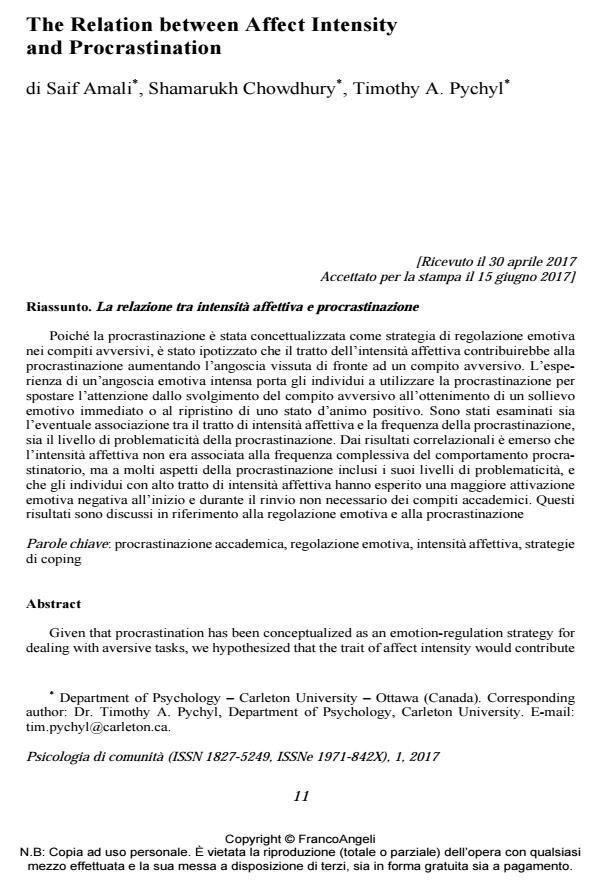The Relation between Affect Intensity and Procrastination
Titolo Rivista PSICOLOGIA DI COMUNITA’
Autori/Curatori Saif Amali, Shamarukh Chowdhury, Timothy A. Pychyl
Anno di pubblicazione 2017 Fascicolo 2017/1 Lingua Inglese
Numero pagine 13 P. 11-23 Dimensione file 210 KB
DOI 10.3280/PSC2017-001002
Il DOI è il codice a barre della proprietà intellettuale: per saperne di più
clicca qui
Qui sotto puoi vedere in anteprima la prima pagina di questo articolo.
Se questo articolo ti interessa, lo puoi acquistare (e scaricare in formato pdf) seguendo le facili indicazioni per acquistare il download credit. Acquista Download Credits per scaricare questo Articolo in formato PDF

FrancoAngeli è membro della Publishers International Linking Association, Inc (PILA)associazione indipendente e non profit per facilitare (attraverso i servizi tecnologici implementati da CrossRef.org) l’accesso degli studiosi ai contenuti digitali nelle pubblicazioni professionali e scientifiche
Given that procrastination has been conceptualized as an emotion-regulation strategy for dealing with aversive tasks, we hypothesized that the trait of affect intensity would contribute to procrastination by intensifying the personal distress experienced when faced with an aversive task. The experience of intense emotional distress shifts individuals’ priority from the practical aspects of making progress on an aversive task to the primacy of immediate emotional relief or mood repair through procrastination. We examined whether or not participants’ underlying trait affect intensity levels were related to the frequency of self-reported procrastination, as well as how much procrastination was problematic for them. The correla-tional results revealed that affect intensity was not related to the overall frequency of pro-crastination behaviour, but that it was correlated with many aspects of procrastination including the severity of procrastination problems, and that individuals high on trait affect intensity experienced more negative emotional arousal when initiating and while needlessly delaying academic tasks. These results are discussed in relation to emotion regulation and procrastination.
Poiché la procrastinazione è stata concettualizzata come strategia di regolazione emotiva nei compiti avversivi, è stato ipotizzato che il tratto dell’intensità affettiva contribuirebbe alla procrastinazione aumentando l’angoscia vissuta di fronte ad un compito avversivo. L’esperienza di un’angoscia emotiva intensa porta gli individui a utilizzare la procrastinazione per spostare l’attenzione dallo svolgimento del compito avversivo all’ottenimento di un sollievo emotivo immediato o al ripristino di uno stato d’animo positivo. Sono stati esaminati sia l’eventuale associazione tra il tratto di intensità affettiva e la frequenza della pro-crastinazione, sia il livello di problematicità della procrastinazione. Dai risultati correlazionali è emerso che l’intensità affettiva non era associata alla frequenza complessiva del comportamento procrastinatorio, ma a molti aspetti della procrastinazione inclusi i suoi livelli di problematicità, e che gli individui con alto tratto di intensità affettiva hanno esperito una maggiore attivazione emotiva negativa all’inizio e durante il rinvio non necessario dei compiti accademici. Questi risultati sono discussi in riferimento alla regolazione emotiva e alla procrastinazione
Keywords:Procrastinazione accademica, regolazione emotiva, intensità affettiva, strategie di coping
- Carver C.S., Scheier M.F., Kumari Weintraub J. (1989). Assessing coping strategies: A theoretically based approach. Journal of Personality and Social Psychology, 56(2): 267-283.
- Carver C.S. (1997). You want to measure coping but your protocol’s too long: Consider the Brief COPE. International Journal of Behavioral Medicine, 4(1): 92-100.
- DeSimone J.A., Harms P.D., DeSimone A.J. (2015). Best practice recommendations for data screening. Journal of Organizational Behaviour, 36(2): 171-181.
- Diener E., Larsen R.J., Levine S., Emmons R.A. (1985). Intensity and frequency: Dimensions underlying positive and negative affect. Journal of Personality and Social Psychology, 48(5): 1253-1265. DOI: 10.1037/0022-3514.48.5.125
- Emmons R.A., King L.A. (1980). Personal striving differentiation and affective reactivity. Journal of Personality and Social Psychology, 56(3): 478-484.
- Flett G.L., Blankstein K.R., Obertynski M. (1996). Affect intensity, coping styles, mood regulation expectancies, and depressive symptoms. Personality and Individual Differences, 20(2): 221-228. DOI: 10.1016/0191-8869(95)00163-
- Gross J.J. (2013). Emotion regulation: taking stock and moving forward. Emotion, 13: 359-365.
- Haghbin M. (2015). Conceptualization and Operationalization of Delay: Development and Validation of the Multifaceted measure of Academic Procrastination and the Delay Questionnaire (Unpublished doctoral dissertation). Ottawa, Canada: Carleton University.
- Larsen R.I. (1984). Theory and measurement of affect intensity as an individual difference characteristic. Dissertation Abstracts International, 85, 2297B. (University Microfilms No. 84-22112)
- Larsen R.J. (2009). Affect Intensity. In Leary M.R., Hoyle R.H., editors, Handbook of individual differences in social behavior. New York: The Guilford Press, pp. 241-254.
- Larsen R.J., Diener E. (1987). Affect intensity as an individual difference characteristic: A review. Journal of Research in Personality, 21(1): 1-39.
- Larsen R.J., Diener E. (1985). A multitrait-multimethod examination of affect structure: Hedonic level and emotional intensity. Personality and Individual Differences, 6(5): 631-636.
- Larsen R.J., Diener E., Emmons R.A. (1986). Affect intensity and reactions to daily life events. Journal of Personality and Social Psychology, 51(4): 803-814.
- Pychyl T.A., Binder K. (2004). A project-analytic perspective on academic procrastination and intervention. In Schouwenburg H.C., Lay C., Pychyl T.A., Ferrari J.R., editors, Counseling the procrastinator in academic contexts. American Psychological Association: Washington, D.C.
- Pychyl T.A., Little B.R. (1998). Dimensional specificity in the prediction of sub-jective well-being: Personal Projects in pursuit of the Ph.D. Social Indicators Research, 45: 423-473.
- Pychyl T.A., Sirois F.M. (2016). Procrastination, emotion-regulation and well-being. In Sirois F.M., Pychyl T.A., editors, Procrastination, Health and Well-Being. New York: Elsevier Academic Press, pp. 163-184.
- Sirois F.M., Pychyl T. (2013). Procrastination and the priority of short-term mood regulation: Consequences for future self. Social and Personality Psychology Compass, 7(2): 115-127.
- Sirois F.M., Pychyl T.A. (2016). Procrastination, health, and well-being. New York: Elsevier Academic Press.
- Steel P. (2007). The nature of procrastination: A meta-analytic and theoretical review of quintessential self-regulatory failure. Psychological Bulletin, 133(1): 65-94. DOI: 10.1037/0033-2909.133.1.6
- Tice D.M., Bratslavsky E. (2000). Giving in to feel good: The place of emotion regulation in the context of general self-control. Psychological Inquiry, 11(3): 149-159. DOI: 10.1207/S15327965PLI1103_0
Saif Amali, Shamarukh Chowdhury, Timothy A. Pychyl, The Relation between Affect Intensity and Procrastination in "PSICOLOGIA DI COMUNITA’" 1/2017, pp 11-23, DOI: 10.3280/PSC2017-001002